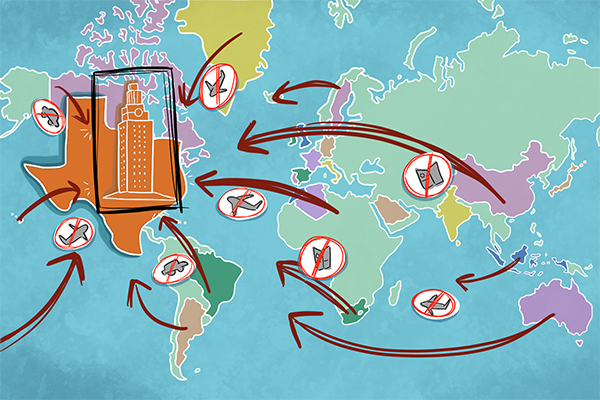International students are facing uncertainty with their future enrollment at the University as COVID-19 causes embassy closures, flight cancellations and immigration policy changes.
These developments have left many international students outside of the United States unable to return. Some incoming international students are trying to defer their admission. Others are forced to take online classes. Additionally, international students who are currently enrolled and take online classes risk losing their visas to attend college in the U.S.
In late April, Anjali Bathra, an incoming business freshman from India, said she asked to defer her admission because of the pandemic, but the Graduate and International Admissions Center denied her request. After talking to more than 30 other incoming international students with similar problems, she started a petition on June 22 asking the University to grant international students admission deferral.
“Many of us are unable to get our visas,” Bathra said. “It was necessary to consolidate and amplify our voices.”
Currently, the petition has more than 2,500 signatures. Bathra said she needs to interview at an American embassy to acquire her visa, but embassies in India have closed.
Two days after the petition was released, Bathra said the University sent her a form to allow international students to request a deferral. The University emailed the appeal form, created last week, to all international undergraduates who previously requested deferral, University spokesperson Joey Williams said in an email.
The next available time Bathra can interview is in February 2021, she said, so she requested deferral through the appeal form and hopes to start college in fall 2021. Less than 20 students have submitted deferral requests as of Sunday, Williams said.
Clinical law professor Elissa Steglich said international student visas are short term visas allowing foreign citizens to study in the United States, usually until graduation or completion of a degree for undergraduate students.
Current federal immigration regulations dictate international students take a full face-to-face course load to maintain F-1 and J-1 student visa status, and only one class can be taken online, according to the Texas Global website. Students should be prepared to follow these guidelines, Williams said.
Steglich said the pandemic has caused unprecedented changes in the immigration system, as the federal government can impose travel bans because of COVID-19.
“The COVID-19 pandemic is unique and is hitting the world with a sheer number of consulate closures and embassy closures,” Steglich said. “(For foreign citizens), it will be increasingly difficult to come to the United States.”
Sulaiman Butt, an incoming business freshman from Pakistan, said he likely cannot travel to Austin to attend classes, as embassy closures prevent him from obtaining a visa and airlines are not regularly flying out of Pakistan. He said he plans to take online classes, but is worried about the quality of education he will receive.
“My latest class would end at 6 a.m.,” Butt said. ”I would be up all night.”
Akai Luo, a classical archaeology senior from China, said she traveled back to China when the University closed in March, and her visa may be jeopardized if she stays abroad for too long. However, if she has to go to Austin this fall, she said she is worried about catching COVID-19.
“I still don’t think UT has any effective safety (measures),” Luo said.
Correction: An earlier version of this story incorrectly stated Luo's pronouns. The Texan regrets this error.





















